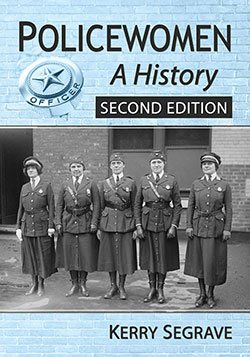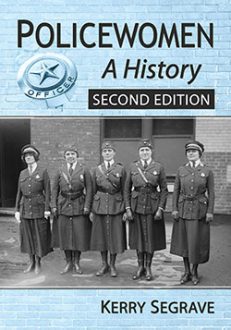Subtotal: $23.99
Policewomen
A History, 2d ed.
Original price was: $39.95.$19.99Current price is: $19.99.
In stock
About the Book
Women in policing have seen three phases of acceptance. Beginning in about 1880, they were admitted as police matrons with extremely limited duties. Next they were accepted as policewomen around 1910–1916, when that title was officially bestowed on them. Finally came assignment of females as general duty officers in the late 1960s and early 1970s. Not coincidentally, an active women’s movement was the driving force behind all three phases.
As women in policing went from matrons to regular officers, they faced harassment and discrimination that only worsened as they neared equality. Many still face it today. This book examines the history of policewomen from 1880 to 2012—particularly in the U.S.—and tells the story of their gradual recognition by the professional establishment of male officers.
About the Author(s)
Bibliographic Details
Kerry Segrave
Format: softcover (6 x 9)
Pages: 380
Bibliographic Info: 23 photos, notes, bibliography, index
Copyright Date: 2014
pISBN: 978-0-7864-7705-0
eISBN: 978-1-4766-1210-2
Imprint: McFarland
Table of Contents
Table of Contents
Preface 1
Introduction 3
1. U.S. (Police Matrons), to 1910 7
2. U.S., 1880–1909 33
3. U.S., 1910–1916 56
4. Foreign, to 1916 114
5. U.S., 1917–1929 129
6. Foreign, 1917–1929 167
7. U.S., 1930–1969 186
8. Foreign, 1930–1969 203
9. U.S., 1970–2012 (Part I) 210
10. U.S., 1970–2012 (Part II) 249
11. Foreign, 1970–2012 284
Conclusion 325
Chapter Notes 327
Bibliography 347
Index 367
Book Reviews & Awards
From the first edition: “topics include: common duties; views of policewomen held by their peers, superiors, and the general public; pressures brought about by their appointment; discrimination and harassment; and their interchangeable assignment with male officers beginning at the end of the 1960s”—Criminal Justice Abstracts.

 Radio’s Captain Midnight
Radio’s Captain Midnight 




